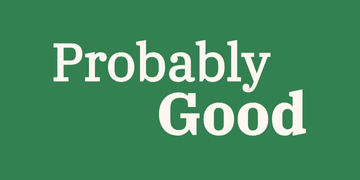When we’re uncertain about how our decisions will play out, it’s helpful to consider the expected value of our actions. In other words, using expected values can provide an idea of what we should “expect on average” from uncertain decisions. It can even be used to help in our most important decisions, like which problems we prioritize or the career we choose, where uncertainty is common.
Overview
Expected value is a concept often used in economics that captures how good an action will be “on average” when we only have limited information.
To calculate an action’s expected value, we take the possible consequences of an action, work out how valuable they would be, multiply them by their probability of happening, and then add them all together.
Let’s say you’re considering buying a lottery ticket for $1. The ticket has a 1% chance of winning $50, but a 99% chance of winning nothing. To calculate the expected value of buying the lottery ticket, we add together 1% of $50 ($0.50) and 99% of -$1 (-$0.99), giving us a negative expected value of -$0.49. Because of this, we probably shouldn’t buy the lottery ticket.
This is a neat example, but most decisions we make are more complicated than whether or not to buy lottery tickets. For instance, it can be hard to identify or define the exact value of different outcomes, and even harder to know exactly how likely they are.
Important decisions under uncertainty
Let’s see how you might use expected value reasoning when making an important decision we really care about at Probably Good: which career you choose to pursue.
Imagine you’re considering two career paths. The first option you’re considering is computer programming. Based on some small coding projects you’ve worked on, you’re fairly confident that you’d be a decent programmer: be able to get a job, and have a very respectable salary. Even more importantly, you’d be able to contribute to many important cause areas through your work, like global health or AI safety. Still, you don’t think you’re an exceptionally good programmer that would revolutionize the field you work in.
The second option you’re considering is becoming a singer/songwriter. On this path, there’s a pretty good chance you’ll end up with no money and no work experience after a while. However, there’s some small chance you’ll become a world-famous star, achieving incredible fame and enormous amounts of money–allowing you to donate a significant portion of it to charity, where research suggests you can save a life for around $5,000. Given the uncertainty inherent to this kind of decision, you don’t know which option will end up having a better outcome.
How can you still intelligently make such a decision? Should you choose the path with the opportunity for the best possible outcome? Or perhaps a “safe bet” that performs well even if things go badly? Well, by using expected values, we can make a quick back-of-the-envelope calculation that can give us more clarity than just using our intuition.
Programming: As a programmer, you think there’s about a 20% chance you’ll be able to do something really impactful. Looking at your best options, you think you could save the equivalent of around 200 lives over the course of your career. This is worth about $1,000,000 in effective donations. There’s an 80% chance you could fail, but you think that whatever job you end up in, you’ll be able to give $2,000 a year to charity (over a 40-year career). Multiplying the probabilities with the value of the outcomes, we get an expected value of $280,000 for pursuing a programming career. Not bad!
Singer/songwriter: If you’re able to be super-successful with your music, you estimate you could give $5,000,000 to effective charities over the course of your career. However, you think there’s only a one in ten-thousand chance that this will happen–after all, it’s hard to become a star. Dividing $5,000,000 by ten thousand, we get an expected value of only $500. Donating $500 can do a lot of good, but this probably isn’t your best option if you want to do good in the world.
Naturally, these are just very rough calculations. If you’re seriously considering an important decision, you’ll likely want to investigate further, giving serious thought to the different variables and the numbers you assign to them. However, as we can see, even quick expected value calculations can give us useful ballpark estimates for important questions.
You can also explore

